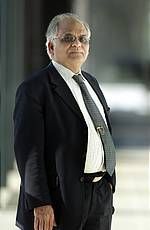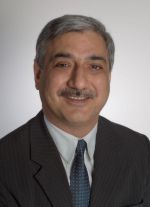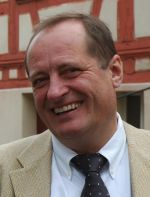


Call for Papers
Important Dates
Keynote Speakers
Paper Submission
Technical Program
Registration
Venue
Travel Information
Accommodation
Committees
Sponsors
ELMAR History
KEYNOTE SPEAKERS
|
Personal Network and 4G Prof. Ramjee Prasad Director, Center for TeleInFrastruktur (CTIF) Aalborg University |
|
Mobile Multimedia: Bringing Users into Focus Dr. Ismail Khalil Ibrahim Institute of Telecooperation |
|
Does Multimodality really help? The Classification Dr.-Ing. Elmar Noeth Lehrstuhl fuer Mustererkennung |
Prof. Ramjee Prasad
Director, Center for TeleInFrastruktur (CTIF)
Aalborg University
DENMARK
Abstract:
The concept of Personal Network (PN) goes beyond the commonly accepted concept of a Personal Area Network (PAN). A Personal Network is a network that connects the user’s PAN to remote networks, like other PANs, infrastructure networks in buildings, or home networks. PAN refers to a space of small coverage around the person where ad-hoc communication occurs. This is also referred to as a Personal Operating Space (POS). PN extend the local scope of PANs to a global one by addressing virtual personal environments that span a variety of infrastructures as well as ad-hoc networks. PAN addresses the problem of the communication between “you and the outer world”, PN extends the PAN concept, as the POS can be distributed all over the world. The network paradigm Personal Networks will become an evolutionary and revolutionary step for communication technology towards the fourth generation (4G) communication. For 4G, not only higher data rates, user capacity, latency and data coverage are parameters of interest, but also technology convergence, personalisation and security plays a leading role. Personal Network addresses exactly these issues, for which it will pave the technology development towards the envisioned 4G. The introduction of Personal Networks is really what captures the convergence of communication technology at all layers for 4G which is highly desirable, and in this context this Personal Networks are a very potent option for future communication networks. 4G can be defined by the following equation:
![]()
Where B3G stands for Beyond Third Generation, defined as the integration of existing systems to interwork with each other and with the new interface. Pers stands for personalisation, which is the key issue in Personal Networks.
About the Keynote Speaker:
Professor Ramjee Prasad is a distinguished educator and researcher in the field of wireless communications. Currently, he is Director of Centre for TeleInFrastruktur (CTIF), and holds the chair of wireless information and multimedia communications. He is a project leader of several international, industrially funded projects. He is the project coordinator of the European sixth framework integrated project “My Personal Adaptive Global NET Beyond (MAGNET Beyond)”. He has published over 500 technical papers, contributed to several books, and has authored, coauthored, and edited twenty books. In addition, Dr. Prasad is the coordinating editor and editor-in-chief of the Springer International Journal on Wireless Personal Communications and editorial board member of other international journals. Dr. Prasad was also the founding chairman of the European Center of Excellence in Telecommunications, known as HERMES and now is the honorary chairman. He is a fellow of IEE, a fellow of IETE, a senior member of IEEE, a member of The Netherlands Electronics and Radio Society (NERG), and a member of IDA (Engineering Society in Denmark). Dr. Prasad is advisor to several multinational companies. He has received several international awards, the latest being the “Telenor Nordic 2005 Research Prize” (website: http://www.telenor.no/om/).
Keynote Speaker's web-page:
Mobile Multimedia: Bringing Users into Focus
Dr. Ismail Khalil Ibrahim
Institute of Telecooperation
Johannes Kepler University Linz
Altenberger Strasse 69
A-4040 Linz
AUSTRIA
Abstract:
Let us borrow this quote from the British humorist and cartoonist Ashleigh Brilliant to summarize the role of mobility in the development of the information society: "Unless you move, the place where you are is the place where you will always be". In more serious terms, new paradigms like pervasive and mobile computing clearly show a trend of using computing and communication power to overcome the physical limitations inherited from desktop computers. Technologies like wireless networks, ambient intelligence, mobile agents, miniaturized computing devices, embedded systems, etc., have enabled a plethora of new types of applications and services. However, usage statistics showed that there is still a huge gap between the potential of such services and their acceptance in practice. In this talk, we will explain and highlight the factors, trends, and issues on how to deploy and utilize mobile multimedia for the design, development and deployment of a content rich, user and business friendly, integrated network of autonomous, mobile agents. One of the major questions to be answered is how to enable the human users to cope with this omnipresence of information. We already observe in the "traditional" Web, how people are suffering from information overflow, receiving too much, the wrong, or even unwanted information. Personalization and adaptivity appear to be potential solutions to this problem but bear the risk of putting the user out of control. Approaches trying to overcome this conflict will be the focus of the presentation.
About the Keynote Speaker:
Ismail Khalil Ibrahim is a senior researcher and lecturer at the institute of telecooperation at Johanes Kepler University Linz, Austria. He is the president of the international organization of Information Integration and Web-based Applications & Services @WAS (www.iiwas.org) and the editor of the handbook of research on Mobile Multimedia published by Idea group, USA and the book Mobile Multimedia: Communication Engineering Perspective. He currently teaches, consults, and conducts research in Mobile Multimedia, Supply Chain Management, Agent Technologies, and the Semantic Web and is also interested in the broader business, social, and policy implications associated with the emerging information technologies. Before joining Johannes Kepler University of Linz in October 2002, he was a research fellow at the Intelligent Systems Group at Utrecht University, Netherlands from 2001-2002 and the project manager of AgenCom project at the Software Competence Center Hagenberg - Austria from 2000-2001. He worked in the University of Technology - Baghdad Iraq as lecturer from 1985-1990, in the Human Resources Training and Development Institute - Iraq as the head of the academic studies department from 1990-1996, in Gadjah Mada University - Indonesia as teaching and research assistant from 1996-2000. His main scientific interests lay in the fields of E-commerce, Mobile Multimedia Applications and Services, Database Applications and Techniques for the Web, Practical Experiences and Applications in Information Integration Systems, Agents for Information Retrieval and Knowledge Discovery, XML and Semi-structured Data Management, Information Systems Management and Development, Information Technology: Impact, Economic Analysis. Dr. Ibrahim has authored around 100 scientific publications, books, and book chapters. He serves as the editor-in-chief of the International Journal on Web Information Systems (IJWIS), Journal of Mobile Multimedia (JMM), editorial board of several journals, including the Columbian Journal of Computing, Radiomatics: journal on Communication Engineering, Business Process Management Journal (BPMJ), The International Journal of Information Technology and Web Engineering and International Journal of Business Data Communications and Networking. His work has been published and presented at various conferences. He is also a reviewer for several conferences and journals.
Keynote Speaker's web-page:
Does Multimodality really help? The Classification
of Emotion and of On/Off-Focus in Multimodal
Dialogue - Two Case Studies
Dr.-Ing. Elmar Noeth
Lehrstuhl fuer Mustererkennung
Friedrich-Alexander-Universitaet Erlangen-Nuernberg
Martensstrasse 3
91058 Erlangen
GERMANY
Abstract:
Very often in articles on monomodal Human-Machine-Interaction (HMI) it is pointed out that the results can strongly be improved if other modalities are taken into account. In this talk we will look at two different problems in HMI: The detection of emotion or user state and the question whether the user is currently interacting with the machine, himself, or another person (On/Off-Focus). We will look at monomodal classification results for these two problems and discuss whether multimodal classification seems to be promising for the respective problem. Different fusion models will be considered. The examples are taken from the German HMI projects "SmartKom" and "Smartweb".
About the Keynote Speaker:
Elmar Noeth studied Computer Science at the University of Erlangen-Nuremberg (Germany) and at MIT (USA). He obtained his 'Diplom' and his doctoral degree at the University of Erlangen-Nuremberg in 1985 and 1990, respectively. From 1985 to 1990 he was a member of the research staff of the Institute for Pattern Recognition (Lehrstuhl fuer Mustererkennung), working on the use of prosodic information in automatic speech understanding. Since 1990 he is an Associate Professor and the head of the speech group at the same institute. From October 1992 until March 1993 he was a Substitute Professor for Phonetics and Phonology at the University of Stuttgart, Germany. From October 2002 until March February 2003 he was a Substitute Professor for Multimedia Computer Science at the University of Regensburg. His current research activities concern prosody, the detection of emotion and user state, multimodal human-machine interaction, and the automatic analysis of pathologic speech. He is the author or coauthor of one book and about 220 technical articles.
Keynote Speaker's web-page:
http://www5.informatik.uni-erlangen.de/Personen/noeth/


